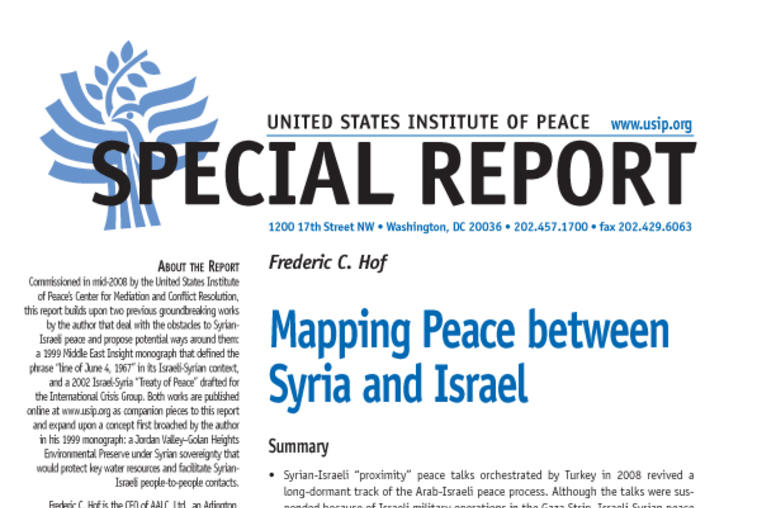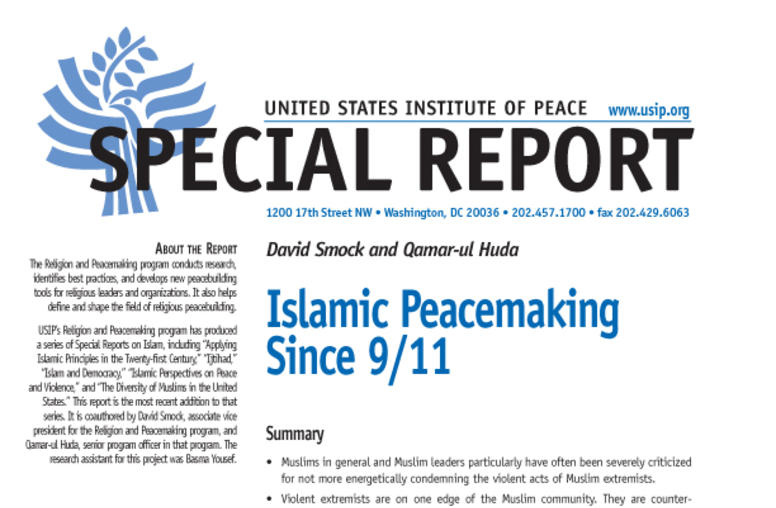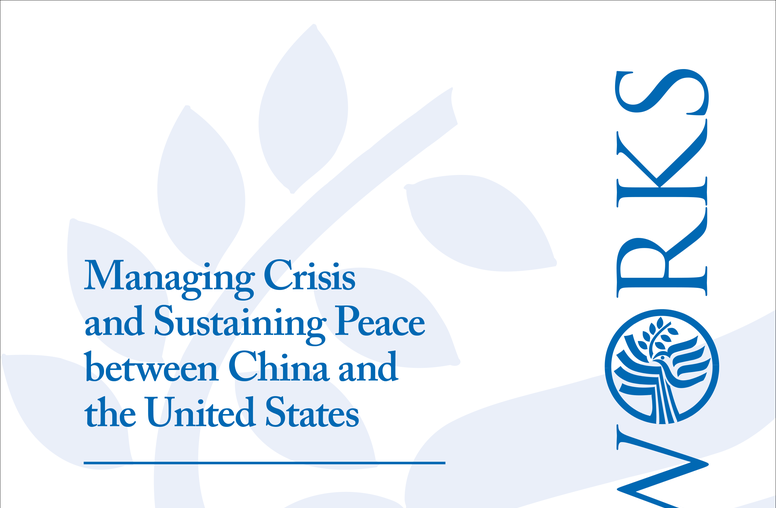Publications
Articles, publications, books, tools and multimedia features from the U.S. Institute of Peace provide the latest news, analysis, research findings, practitioner guides and reports, all related to the conflict zones and issues that are at the center of the Institute’s work to prevent and reduce violent conflict.

Mapping Peace between Syria and Israel
Although the Palestinian-Israeli “track” of the Arab-Israeli dispute remains at the heart of the conflict between Israel and its neighbors, the very complexity of that track (Jerusalem, refugees, borders, etc.) has led some to consider the Israeli-Syrian track to be relatively simple and straightforward. While simple it is not and straightforward it is only in relative terms, the Syrian-Israeli conflict can indeed be settled without prejudice to the central act of the Arab-Israeli drama.
Pakistani Public Opinion on Democracy, Islamist Militancy, and Relations with the U.S.
In this volatile election season in Pakistan, attention is once again turning toward Pakistani national identity, security, and foreign policy. To better assess the situation, USIP and WorldPublicOpinion.org conducted a joint public opinion survey of urban Pakistanis on a wide array of compelling policy questions.
Keeping an Eye on an Unruly Neighbor: Chinese Views of Economic Reform and Stability in North Korea
What is the nature of internal Chinese debate regarding North Korea? In the event of instability in the Korean peninsula, how would Beijing respond? Drawing on discussions with North Korea specialists during a Center for Strategic and International Studies-USIP delegation visit to the People's Republic of China, this report explores these and related issues.
Disabling DPRK Nuclear Facilities
While the October 3, 2007 Six-Party Talks accord outlines a roadmap for the disablement of North Korea’s core nuclear facilities, the specific details of the nuclear disablement process are still being developed. USIP’s Korea Working Group commissioned this Working Paper in order to facilitate a better understanding of nuclear disablement.
New Hopes for Negotiated Solutions in Colombia
Drawing from a series of conferences and events organized by USIP, this report examines the status of current peace initiatives in Colombia with the National Liberation Army (ELN) and the Colombian Revolutionary Armed Forces (FARC). It also assesses the paramilitary demobilization process and analyzes the role of local, national, and international third-party actors in each of these processes. The analysis reflects developments on the ground through the end of September 2007.

Islamic Peacemaking Since 9/11
Muslims in general and Muslim leaders particularly have often been severely criticized for not more energetically condemning the violent acts of Muslim extremists. The uninformed often assume that extremists represent Islam’s mainstream.
Seven Months Into the Surge: What Does It Mean For Iraqis?
Based on conversations held in the summer of 2007 with Iraqi political leaders, senior government officials, members of parliament, and Iraqi citizens, this report shows that the security and political situations in Iraq in the summer of 2007 were tentatively and marginally improved in Baghdad but in a state of flux, and that the political process was far behind the military effort.
Building Democracy in Burma
This report was commissioned by USIP's Center for Conflict Analysis and Prevention. It draws on the deliberations of prominent U.S. and international academics and NGO/IGO representatives on how the international community can prepare itself to support the inevitable future political transition in Burma. Read Priscilla Clapp's Special Report, Burma's Long Road to Democracy, published in November 2007.
Correlates of Public Support for Terrorism in the Muslim World
This report was commissioned by USIP's Center for Conflict Analysis and Prevention. Consistent with the center’s commitment to conflict prevention, this report aims to inform the center’s ongoing work to expand the understanding of the determinants of terrorism and its support base.

Managing Crisis and Sustaining Peace between China and the United States
A series of crises have strained relations between the People’s Republic of China and the United States since the end of the Cold War. Although none of these crises led to direct military hostilities, they have had an adverse impact on bilateral relations and portend future such crises between the two countries. To determine how best to mitigate such crises in the future, it is important to study these recent crises and identify the positive and negative responses and actions of both governm...